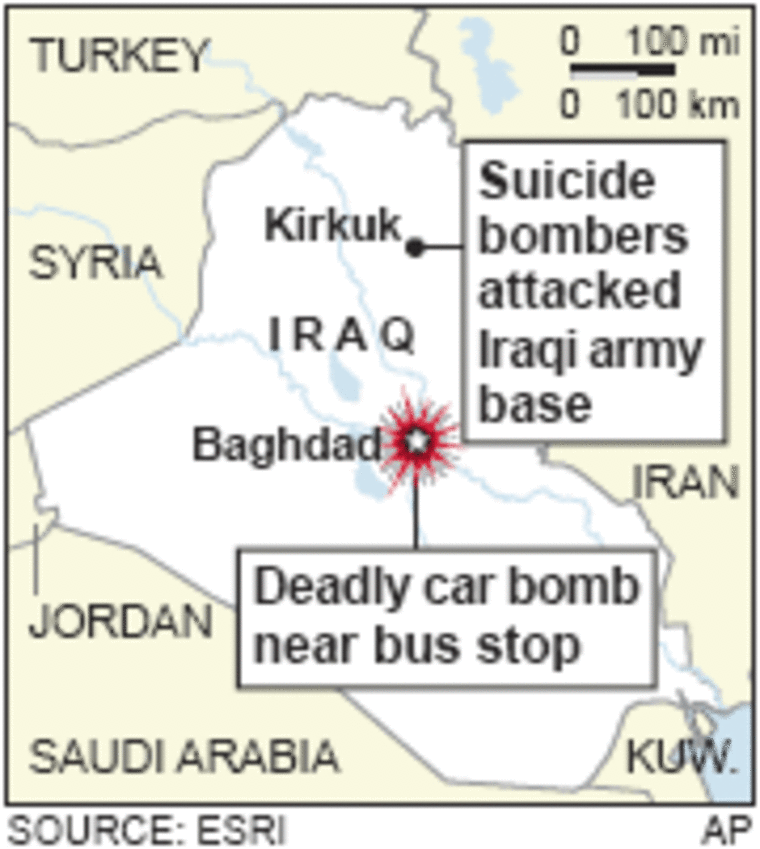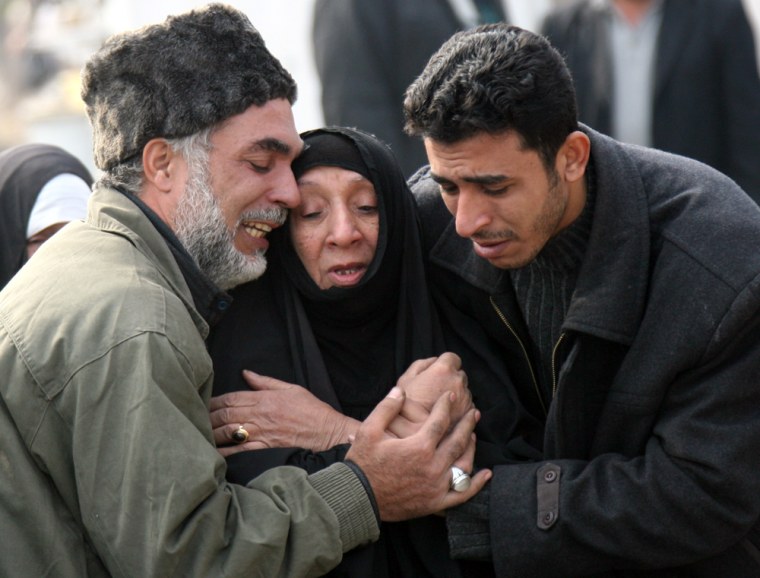A car bomb exploded near a crowded bus stop in eastern Baghdad during morning rush hour on Wednesday, killing 11 people and wounding 27 in a mostly Shiite area, police said.
In northern Iraq, two suicide car bombers attacked an Iraqi army base, killing four soldiers and wounding 10, an officer said.
The bus stop blast in Baghdad’s Kamaliyah neighborhood went off about 50 yards from the Shiite al-Rasoul mosque but did not damage the small building, according to police Capt. Mohammed Abdul-Ghani and police Maj. Mahir Hamad.
“A Volkswagen car exploded right near the bus stop, hitting a group of people, including women and children who were waiting to take a bus to a fruit and vegetable market,” said one witness, Abu Haider al-Kaabi.
As ambulances and Iraqi police raced to the scene, Iraqi and U.S. soldiers briefly closed off the area.
Later, people were allowed to search the street to see if the casualties included their relatives. The wreckage of the bomber’s car and other damaged vehicles were towed from the scene. Young men swept debris from the street.
“I was working at a construction site nearby when the bomb exploded. My friends and I raced to the bus stop and took six of the wounded people to a nearby hospital in our cars,” said Mohammed Saadoun, 34. He said they also helped to remove three charred bodies from the scene.
Army headquarters attacked
In the northern Iraq attack, troops opened fire on the bombers as they drove up to the headquarters of the Iraqi army 2nd Battalion, and the attackers set off their explosives right outside, said Maj. Gen. Anwar Mohammed Amin, who provided the casualty figures.
The base is 25 miles southwest of the oil-rich city of Kirkuk, and its soldiers are in charge of protecting the area’s oil pipelines.

Violence between Sunni Arabs and Shiites has been roiling neighborhoods across the capital. On Nov. 23, suspected Sunni insurgents carried out the deadliest single attack of the Iraq war by using bombs and mortars to kill 215 people in the capital’s Shiite slum of Sadr City.
On April 16, a bomb hidden in a shopping bag on a minibus exploded near the al-Rasoul mosque, killing at least three passengers and wounding six, police said.
For several months, U.S. and Iraqi officials have been discussing proposals to transfer responsibility of security in Baghdad and other cities from American forces to newly trained Iraqi police and soldiers. The U.S. maintains about 140,000 troops in Iraq, which the U.S.-led coalition invaded in March 2003.
Security turnover to Iraqis?
The New York Times reported Wednesday that Iraq’s government has presented the United States with a plan that calls for Iraqi troops to assume primary responsibility for security in the city of Baghdad by March.
The official quoted in the article, Mouwafak al-Rubaie, Iraq’s national security adviser, was not immediately available for comment on Wednesday morning, but U.S. military spokesman Lt. Col. Christopher Garver said American and Iraqi officials have been weighing proposals about the transfer of power over security in Iraq for several months.
“Where Baghdad falls into that — the details of an operational turnover — we won’t discuss ahead of time. But turnover of the security of Baghdad is obviously a piece of the turnover of responsibility of security in all of Iraq to the Iraqi government,” Garver said in a telephone interview.
On Oct. 28, President Bush and Iraqi Prime Minister Nouri al-Maliki outlined three goals: speeding up the training of Iraq’s security forces; moving ahead with Iraqi control of its forces; and making the Iraqi government responsible for the country’s security.
Maj. Gen. William Caldwell, the country’s top American military spokesman, told reporters in Baghdad on Dec. 5 that the U.S. military expects all of Iraq to be under the control of Iraqi forces by mid-2007. He said this is part of an accelerated timetable discussed by Bush and al-Maliki during their summit in Jordan late last month.
In an interview with ABC on the day of the summit, al-Maliki said Iraqi forces would be ready.
“I can tell you that by next June, our forces will take over the security of the country,” he said.
On Tuesday, a suicide bomber struck a crowd of mostly poor Shiites in Baghdad, killing at least 63 people and wounding more than 200 after luring construction workers onto a pickup truck by offering them jobs as they were eating breakfast.
The blast, condemned by both Shiite and Sunni lawmakers, came on a day when the U.S. military reported the deaths of five more troops. At least 59 other Iraqis were also killed or found dead, including an AP Television News cameraman who was shot while covering clashes in the northern city of Mosul.
At least 2,939 members of the U.S. military have died since the Iraq war started in March 2003, according to an Associated Press count.
